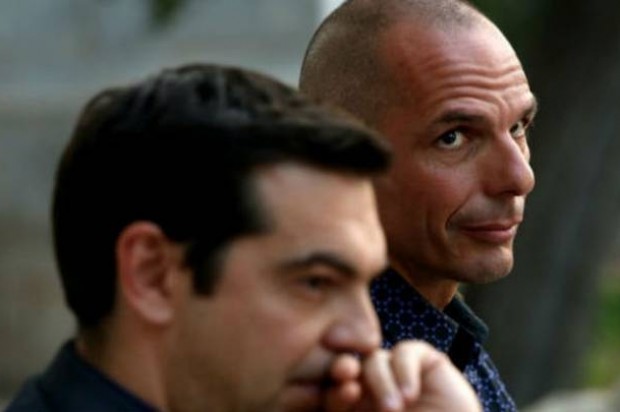By Nefeli Agkyridou, CNBC.com
It’s payback time for Greece. Despite securing a four-month lifeline on its loans, the bills are already piling up. On top of this month’s repayments to the International Monetary Fund worth a total of 1.5 billion euros, the country faces debt obligations amounting to 22.5 billion euros ($24.8 billion) for 2015.
A snap election on January 25th led to a new government headed by left-wing Syriza party, which has pledged to make a break from the past austerity measures imposed on it by its lenders. Five years down the line, and Greece is still tied to two loan programs worth 240 billion euros overseen by the so-called Troika of the European Commission, the European Central Bank and the IMF. The bailout, that was due to expire at the end of last year, has been extended twice to give time to Greece’s international creditors to negotiate with the new government.
State revenues, key to helping Greece repay its loans, dropped dramatically in January as people stopped paying taxes in the hope of new legislation. Banks, meanwhile, have been hit by a big wave of capital flight as depositors took money abroad in fear of a “Grexit”.
Meanwhile, Spain’s finance minister, Luis de Guindos, said this week that a third bailout on top of the 240 billion euros already doled out is inevitable.
“It is absolutely clear from a market’s perspective that Greece will have to continue relying on official sector financing if it likes to stay in the euro. The new government may try different ways to raise tax revenue etc. than previous governments, but investors have heard the same song over and again”, David Schnautz, interest rates strategist for Commerzbank in New York told CNBC.
Athens in fighting mood
The new Greek government is pushing for the money that it thinks is rightfully theirs. Finance minister Yanis Varoufakis has been arguing that the ECB should release 1.9 billion euros that it gained in interest from its Greek bond holdings. These proceeds, currently held by other euro zone countries, would be returned to Greece once the final review of the country’s bailout programme was concluded.
A further 7.2 billion euros, the last tranche of aid from this second package, is also to be released. Eurogroup President Jeroen Dijsselbloem said this week that a first disbursement could be made as soon as this month, if Greece picked up the speed of its reforms — as the country agreed on February 20th.
However, the Greek government is still looking for help to alleviate the effects of the country’s hated austerity measures. This week it announced a first set of measures, including free meals and electricity for 300,000 poor households and housing subsidies for 30,000 families. They also introduced a bill to reopen the state broadcaster ERT, which was shut down in 2013 by the former government, and a settlement plan for those who still owe taxes back to the state.
“Any social spending measures should be part of a new program that the government is supposed to negotiate until April. Otherwise, the government will lose credibility points that will cost during these negotiations. Moreover, introducing such measures now, will increase funding pressures even more in the months ahead”, Thanos Vamvakidis, Head of European G10 FX Strategy at Bofa Merrill Lynch told CNBC.
No sale
In another controversial move, Prime Minister Alexis Tsipras withdrew last week a construction permit from the Skouries goldmine in Northern Greece, to “protect the environment and public interest.” The mine employs 2.000 people, at a time when Greek unemployment is at 26 percent.
The move drew instant criticism from the mine’s managers.
“Since 2012 we have invested in excess of US$450 million on the construction and development of two mines in Greece. Once these mines reach commercial production, Hellas Gold will become one of Greece’s top exporters”, said Paul Wright, Chief Executive of Canadian gold miner Eldorado that has invested in the project through its subsidiary Hellas Gold.
The original bailouts came with a series of conditions, including selling-off state assets. However, privatizations are a thorny issue for Syriza. A pending sale for Greece’s regional airports, which would immediately bring the government 1.25 billion euros – almost as much as March’s repayments — is being challenged by the government even though it’s not an actual sale but a 40-year lease. The deal, struck with German airport operator Fraport and Greece’s Copelouzos energy group, would also guarantee the state 23 million euros per year and the commitment to further invest 1.4 billion euros to develop these airports to international standards.
“By withdrawing the permits from the Canadian Gold mine in Skouries and threatening to stop ongoing privatizations the government has done irreparable harm to investor confidence and to the nascent recovery”, Miranda Xafa, senior scholar at the Center for International Governance Innovation (CIGI) told CNBC.
The Greek government is going to have a hard time finding a balance between its electorate and the country’s immediate financing needs. On Monday during a Eurogroup meeting in Brussels, Varoufakis is expected to present his euro zone peers with six reforms. It remains to be seen how well this will go down with Greece’s creditors.










